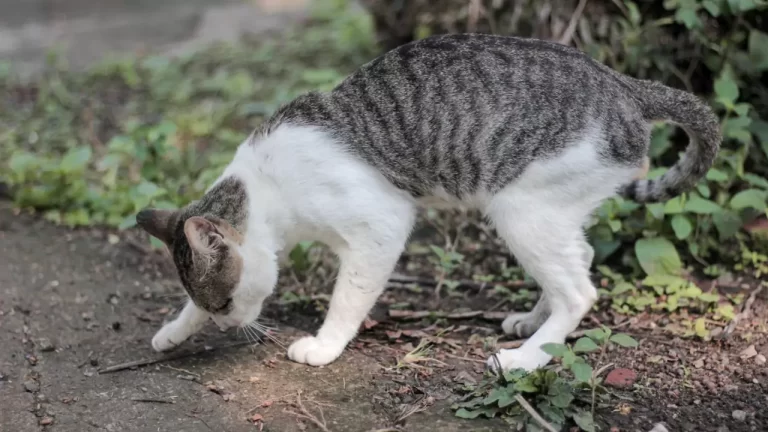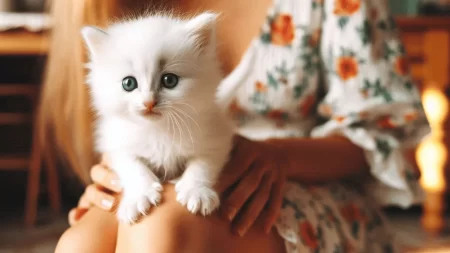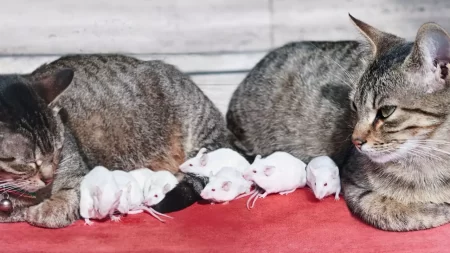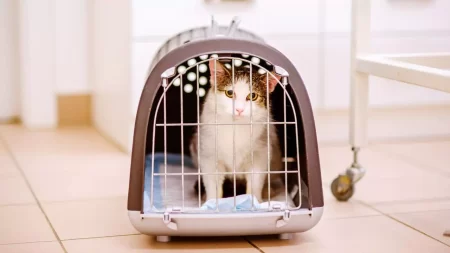Cats can hold their poop for approximately 24-48 hours, with the average feline capable of withholding it for about 36 hours. While it’s not ideal for a cat to go beyond this timeframe, it’s generally not harmful. However, any period exceeding 48 hours warrants concern, necessitating a prompt consultation with a veterinarian.
Factors That Affect How Long a Cat Can Hold Their Poop
There are many factors that can influence how long a cat can hold their poop, such as:
- Age: Older cats may have weaker muscles or reduced mobility, which can make it harder for them to poop. They may also have slower digestion or lower metabolism, which can affect their pooping frequency. Younger cats may have faster digestion or higher metabolism, which can make them poop more often.
- Diet: The type and quality of food that a cat eats can have a big impact on their pooping habits. Some foods may be more digestible or nutritious than others, which can affect how much waste a cat produces. Some foods may also contain more fiber or moisture, which can help soften the stool and make it easier to pass. Cats that eat dry food may need more water to prevent dehydration and constipation. Cats that eat wet food may have softer or more frequent stools.
- Exercise: Being active can help keep your digestive system working well and help you have regular bowel movements. Cats that like to play and move around may go to the bathroom more often than cats that like to stay inside and sleep. Also, exercise can help lower worry and anxiety, which can change the way cats poop.
- Stressful situations: Cats are sensitive creatures that can get stressed by various factors, such as changes in their environment, routine, or social interactions. Stress can cause cats to lose their appetite, have diarrhea, or hold their poop for too long. Cats that are stressed may also hide or avoid their litter box, which can make it harder for them to poop.
- Medical conditions: Some health problems can affect the pooping frequency and quality of cats, such as kidney disease, diabetes, hyperthyroidism, inflammatory bowel disease, parasites, or tumors. These conditions can cause symptoms such as vomiting, weight loss, lethargy, or blood in the stool. Some medications or treatments can also affect the pooping habits of cats, such as antibiotics, steroids, or chemotherapy.
Normal Pooping Frequency for Cats
Most cats poop about once a day, but it’s also normal for a cat to poop every 12–36 hours. Kittens have a bowel movement frequency of up to three times a day, however, older cats often have a lower frequency.
The frequency your cat poops will depend on their:
- Diet
- Activity levels
- Age
- Whether they have any known medical issues
If it has been more than 48–72 hours since your cat has pooped, you should speak to your veterinarian for advice.
What to Do if Your Cat is Not Pooping?
If your cat is not pooping as often as usual or has not pooped for more than two days, it may be a sign of constipation, which is a serious and painful condition for cats. Constipation can cause complications such as impaction, obstruction, or megacolon, which can damage the colon and require surgery. Therefore, it is important to take action if your cat is not pooping, such as:
Seek Veterinary Care
The first and most important step is to consult your veterinarian, who can diagnose the cause and severity of the constipation, and prescribe the appropriate treatment. The treatment may include medications, such as laxatives, stool softeners, or enemas, to help the cat pass the stool. The treatment may also include surgery if the constipation is caused by a physical obstruction or a severe case of megacolon.
Consider Changing Their Diet
The second step is to review and modify the diet of your cat, to make sure they are getting enough fiber and moisture, which can help prevent and treat constipation. You can try switching to a high-fiber or high-moisture food, such as canned or raw food, or adding some pumpkin, psyllium, or bran to their food. You can also try adding some probiotics or digestive enzymes to their food, to improve their gut health and digestion.
Increase Fiber Intake
The third step is to increase the fiber intake of your cat, which can help bulk up and soften the stool, and make it easier to pass. You can do this by offering some natural sources of fiber, such as fresh or dried fruits, vegetables, or grass, or some commercial products, such as fiber supplements, treats, or chews. However, you should not overdo it, as too much fiber can cause diarrhea or gas, which can be uncomfortable for your cat.
Provide Access To Fresh Water
The fourth step is to provide your cat with plenty of fresh and clean water, which can help hydrate them and prevent dehydration and constipation. You can do this by placing multiple water bowls around the house or using a fountain or a dripping faucet, to encourage your cat to drink more. You can also add some flavor to the water, such as tuna juice or chicken broth, to make it more appealing for your cat.
How Long Can a Cat Go Without Pooping?
The answer to how long a cat can go without pooping depends on the situation and the reason for the lack of pooping. For example:
After Surgery
If your cat has undergone surgery, such as spaying, neutering, or dental work, they may not poop for a day or two, due to the anesthesia, pain, or stress. This is normal and expected, and you should not worry too much, as long as your cat is eating, drinking, and acting normally. However, if your cat has not pooped for more than two days after surgery, or shows signs of discomfort, you should contact your veterinarian, as they may need some help to relieve their constipation.
When to worry about a cat not pooping?
If your cat has not pooped for more than two days and shows signs of distress, such as straining, crying, licking, or dragging their rear end, you should be concerned, as they may have a severe case of constipation, or a more serious condition, such as a blockage, infection, or tumor. You should seek immediate veterinary attention, as your cat may need emergency treatment to save their life.
How to help a constipated cat?
If your cat is constipated, you should try to help them by following the steps mentioned above, such as seeking veterinary care, changing their diet, increasing their fiber intake, and providing them with water. You should also try to make them more comfortable, by keeping their litter box clean and accessible, massaging their abdomen gently, and providing them with a warm and cozy place to rest. You should also monitor their pooping habits closely, and report any changes or concerns to your veterinarian.







